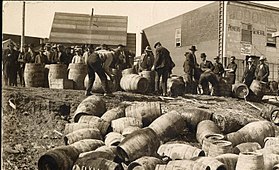走私酒类
| 此条目没有列出任何参考或来源。 (2021年7月25日) |
走私酒类(英语:Rum-running或bootlegging)是指在法律禁止的地方运输(走私)酒精饮料的非法业务。走私通常是为了避开特定管辖范围内的税收或禁酒令法律。“rum-running”一词通常适用于水上走私;“bootlegging”则适用于陆地走私。

“bootlegging”一词起源于美国内战期间,当时的士兵们将一品脱的酒瓶藏在靴子里或裤腿下,偷偷带进军营。另外,根据公共广播电视公司纪录片《禁酒令》所说,当成千上万的城市居民在各大城市和农村地区用他们放在靴腿里的酒瓶卖酒时,“bootlegging”这个词就流行起来了。“rum-running”一词在1916年已经流行,并在美国禁酒时期(1920年-1933年)被使用,当时从巴哈马西部的比米尼出发的船只将廉价的加勒比海朗姆酒运到佛罗里达州的地下酒吧。不过,朗姆酒的廉价性使其成为走私朗姆酒贩子的低利润项目,他们很快转移走私加拿大威士忌、法国香槟和英国毡酒到纽约市、波士顿和芝加哥等大城市,那里的价格很高。据说,有些船只一次就携带了20万美元的违禁品。
参见 编辑
延伸阅读 编辑
- 《The Black Ships: Rumrunners of Prohibition》(1979年),作者:Everett S. Allen
- 《Rum Row》,作者:Robert Carse
- 《Prohibition: America Makes Alcohol Illegal》(1995年),作者:Daniel Cohen
- 《Prohibition and Rum Running on Lake Erie》(2006年),作者:David Frew
- 《The Rumrunners: A Prohibition Scrapbook》(1980年),Revised & Expanded(2009年),作者:Marty Gervais
- 《Whisky and Ice: The Saga of Ben Kerr, Canada's Most Daring Rumrunner》(1995年),作者:C. W. Hunt
- 《Rumrunning and the Roaring Twenties: Prohibition on the Michigan-Ontario Waterway》(1995年),作者:Philip P. Mason
- 《I was a rum runner》(1979年),作者:Don Miller
- 《Canada's Rumrunners: Incredible Adventures and Exploits During Canada's Illicit Liquor Trade》(2004年),作者:Art Montague
- 《The diary of a rum-runner》(1929年),Reprint(2006年),作者:Alastair Moray
参考资料 编辑
外部链接 编辑
- Data on Alcohol Smuggling: Havocscope Black Markets (页面存档备份,存于互联网档案馆)
- http://www.uscg.mil/history/articles/RumWar.pdf (页面存档备份,存于互联网档案馆)
- http://www.uscg.mil/history/webcutters/Seneca1908.pdf (页面存档备份,存于互联网档案馆)
- http://www.providenceri.com/narragansettbay/rum_runners.html#blackduck (页面存档备份,存于互联网档案馆)
- "Bootleggers and Baptists in Retrospect"
- "Submarine on Wheel is Used as Rum Runner" Popular Mechanics, November 1930 (页面存档备份,存于互联网档案馆)
- Rum Runner (页面存档备份,存于互联网档案馆) at A History of Central Florida Podcast (页面存档备份,存于互联网档案馆)